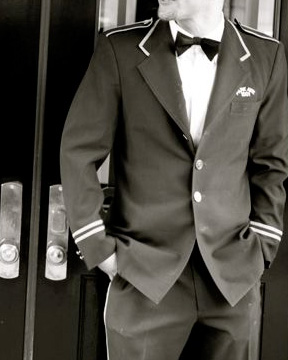
Update: A tentative labor agreement has been reached today, Tuesday, between the Realty Advisory Board on Labor Relations (RAB) and 32BJ SEIU for New York City’s 30,000 Residential Building Service Workers, a press release announced. “We have a deal!” 32BJ President Kyle Bragg said. Howard Rothschild, president of RAB said, “The industry is proud to have reached a fair agreement.” More to come!
By Carol Tannenhauser
I went downstairs early Tuesday morning to get the night doorman’s take on the impending building strike. To my surprise, I encountered a day doorman, looking tousled and tired.
“I’m the new Adalto,” he announced. Adalto, the night man, had recently retired. “You got the night shift?” I asked. “How do you feel about that? Did you choose it?” “My regular shift got cut during the pandemic,” he said. “I had to take it.” “At least you can be home all day with Emma,” I offered. Emma is his seven-year-old daughter. “You gotta sleep sometime,” he said, smiling. “So, how can I help you, ma’am?”
I lowered my voice in the empty lobby. “What do you hear about the strike?” I asked.
“This happens every four years,” he said, making clear he wasn’t too worried, and maybe I shouldn’t be, either. “They have to agree on a contract. They want to take some things away — sick and vacation days. And they want you to pay more when you go to the doctor. They always hype it, but it usually turns out okay and we keep it moving.”
But not always. There was a residential building strike in 1991 that lasted for 12 days, ending on May 3rd. On May 1st, the Los Angeles Times wrote,
“It began as one of the more genteel labor disputes this fractious city has witnessed. Many striking doormen, porters, elevator operators and handymen were even treated to coffee and sweet rolls by apartment dwellers who were often their employers.”
But 11 days later, the paper reported, there was no end in sight. And so, irritated New Yorkers began “returning to form,” as the west coast Times described it.
“Strikers roughed up a private guard for operating an elevator at one Upper West Side building last week,” The Times reported. “Not far away, residents of another building returned the favor, pelting striking workers who were playing whiffle ball in front of the building with garbage and epithets.”
Closer to home, and perhaps a bit less excited about the city’s rough edges, The New York Times presented a more positive view on May 3rd, the day the strike ended.
“The union communicated quickly with its 30,000 members,” the paper reported, “and many had shifted enthusiastically from picketing to working by early evening. Richard Koch was back as the doorman at 465 West End Avenue, at 82nd Street, working his regular 4 P.M.-to-midnight shift.”
Back to 2022 and the eve of a possible strike: I went downstairs to walk the dog, using the opportunity to quiz the morning doorman. He told me that building workers are not paid during a strike, and they don’t get unemployment. “It’s a hardship for a lot of guys,” he said. “They have mortgages to pay and bills. They live from check to check. The uncertainty is very hard.” He shook his head. “I don’t want a strike. I don’t want a strike.”
The afternoon doorman was conflicted. He has a serious heart condition and doesn’t want his health care or providers changed. On the other hand, he remembers the strike of ’91, “walking up and down in front of the building — in front of the shareholders — shouting. It was embarrassing,” he said.
The building’s super is in a different union; he says if there’s a strike, he can’t do anything except in an emergency. He talks a lot about other workers not “crossing the fence.” He said FedEx and UPS likely won’t cross, nor will Amazon. His advice: send your packages through the U.S. Postal Service.
Most contractors won’t cross the picket line, the super said. So don’t have your place renovated now, and be prepared for a freeze if there is a strike.
The contract runs out at midnight on Wednesday, April 20, 2022.
Hold the Presses!
ABC7 has just reported,
Talks to avert a doorman strike in New York City “are progressing,” with hopes both sides will come to a resolution ahead of Wednesday’s strike deadline.
“I would say that things are progressing and hopefully as they continue to progress, we’ll find a path to a resolution of this agreement that these essential workers, they deserve and earn,” 32BJ-SEIU President Kyle Bragg, who represents the doormen, said on NY1 Tuesday morning.
It’s a sentiment that the Realty Advisory Board shares. “While we have made progress over the past few weeks of negotiations, we still have a gap to bridge,” said Howard Rothschild, President of the Realty Advisory Board in a statement. “We are committed to meeting with the union leadership every day to achieve a fair contract for both sides by April 20th.”
My super said they could beat the deadline, extend the deadline, or negotiate right up to the deadline. You better believe I’ll be standing with him in the lobby at 11:55 pm on Wednesday night, waiting to see if a union rep comes to pull the new night doorman off his post and onto a picket line.









My building isn’t affected either way. But it’s good to see sensible heads prevail.
I didn’t realize that our building help has no pay during a strike. That is a hardship and changes the complexion of things, though i must say, many of our doorman have additional houses in the country and beautiful automobiles, neither of which I have.
Many of these people are old timers who have rent controlled or rent stabilized apartments and have steadily worked hard all of their lives. they have earned whatever they got. And holiday gifts, for exceptional service, didn’t hurt.
Does anyone know what the average wages are for Doormen, Handymen and Porter’s?
From the NYT:
“Annual wage increases averaging 3 percent over four years will bring the pay for a typical doorman (most of the doormen are male) to approximately $62,000 by the end of the contract in 2026, the two sides announced. The agreement also includes a $3,000 bonus this year, they said.” That’s somewhat less than the median NYC household income of about 67m.
It’s settled ……A contract has been reached.
In 2022, it’s no longer reasonable for an employer (in this case, owners of condos and coops) to pay 100% of their employees health insurance premiums. The building workers should have to contribute to their health insurance premiums like the rest of us. The new contract will make the average salary about $62,000. They can kick in for their health insurance with some of their Christmas/Hanukkah bonus money!
You will pry 100% employer paid health insurance costs out of union’s cold dead hands.
That perk alone is worth a pretty penny to beneficiaries, but costs employers (including state and local governments) plenty.
As part of Obama’s “affordable healthcare act”, so called “Cadillac” health insurance plans were to be taxed as income. In one of the few instances big money and unions aligned both fought back against that provision. Not surprisingly under Trump administration it was dropped.
If 100 percent employer paid health insurance is part of employee compensation and it is changed, the employee’s pay has been cut.
Why is it no longer reasonable?
Please express your opinion as opinion, not fact.
Many of The staff at our residential buildings become like family and most have families. Try raising a family on a salary of $62,000 a year in NYC and have some peace of mind and security. Any Holiday bonuses are purely at the discretion of the residents and not predictable. As to some comments like “many of them drive fancy cars”, and “have summer homes in the country” are an exaggeration or fake news. Gotta love come of the critical comments by some that show little empathy, or understanding of this situation.
Warm up.
I agree that the employer should not have to pay for health insurance, out taxes should be used to pay for universal health coverage, like every other industrialized country. Tying health coverage to employment is idiotic.
Congratulations to the workers who won a wage increase without having to give up their hard-won benefits. Our super, doormen, porters, and maintenance men kept our building functioning throughout the pandemic when many of us chose to hunker down. They deserve it!
Absolutely!!!
If a building has rent controlled and stabilized apartments and there are staff cuts (like doorperson shifts), they can register complaints with the state to get the services restored (and the day doorman his day shift again)
Just to be clear, not all multi-family buildings in city are union. There are plenty of rental, co-op and condo buildings that are non-union.
Trend among new construction for past decade or more is to go with non union especially for condo or co-op. It simply comes down to building maintenance/running costs, and non-union lowers those numbers by about 40%.
https://www.brickunderground.com/blog/2014/04/what_are_the_pros_and_cons_of_buying_in_a_building_with_union_labor
Our building needed to add staff a few years back….we explored all options, and the conclusion we came up with, was we would pretty much do anything NOT to add another union position to our payroll. We opted to hire multiple part time employees, which has worked just fine, and actually offered us more flexibilty.
Aside from benefits, which are absurdly expensive, union employees can almost never be fired, and eliminating a union position from the payroll is essentially impossible. We are a relatively small building that needs to control expenses. So while everyone cheers for these union victories, in real life it definitely affects how buildings hire. The more generous the benefits, the less attractive union labor becomes, so you will see less hiring or hiring part-time non-union employees.
Yes, it is difficult to terminate union employees, but a building does have remedies.
Knew of a situation where a doorman had trouble keeping his mouth shut. He said something he shouldn’t to one of the maids. It so happens this woman worked for co-op board president. Doorman was gone within less than two weeks. Union moved him to another building.
NYS is an at will employer state, meaning employees can be terminated for any or no reason. Unions make it more difficult, but terminations can still happen. It’s just like any other place, process begins of laying down ground work by establishing a paper trail (written notices). If said building employee doesn’t shape up, they can be fired.
Again union may simply move offending worker from one building and place him in another. But long as he’s gone that’s all most places care about.
BB, something similar happened in our union building where one of the younger doormen um, came onto a female resident. He was gone within a week of the complaint. (No comment on the behavior of the tenant.)
So you don’t want the folks providing you protection and security any health benefits or protection for themselves?
What goes around comes around, Frank.
Your rent is about to go up.
When we value people it is important to take care of them in the short and midterm and long term. In my humble opinion I think the negotiations covered the short and mid term effectively give or take some thoughts. However in the long term, I wished each building person who helps all do better to be awarded a million dollar life insurance policy regardless of union or non union status. Just a clear across the board one million dollar life insurance policy for free. Then maybe we might understand essential worker appreciation differently.